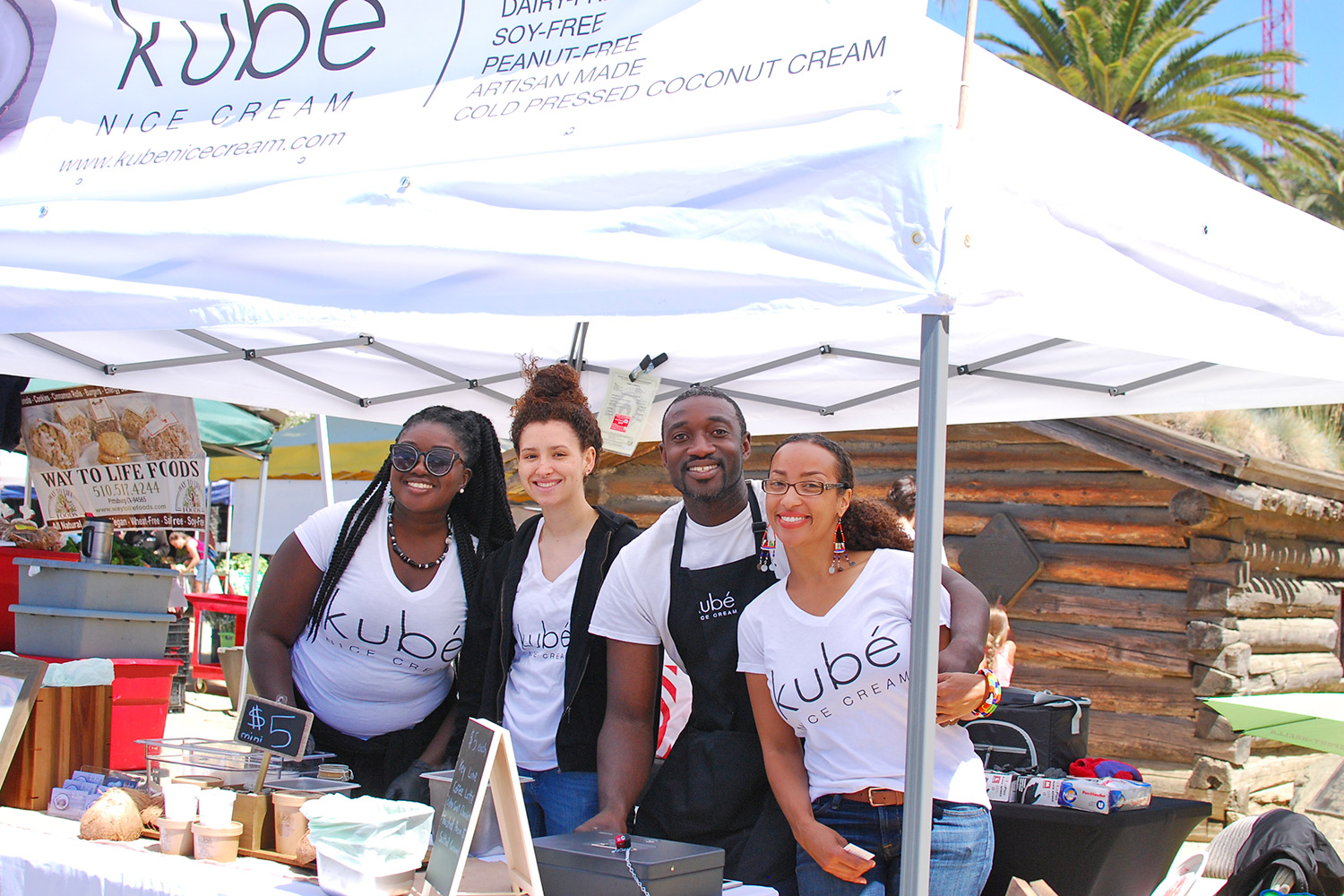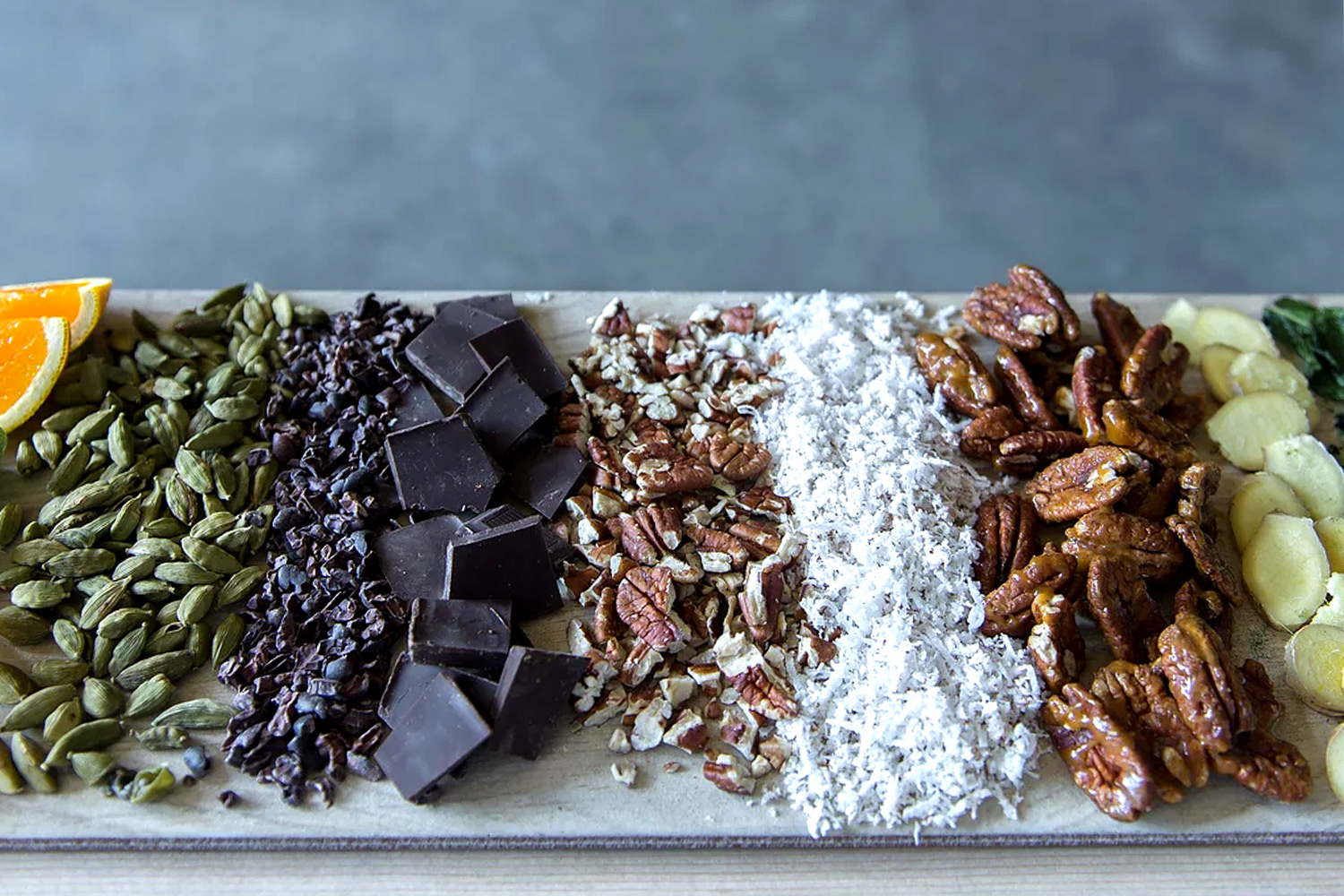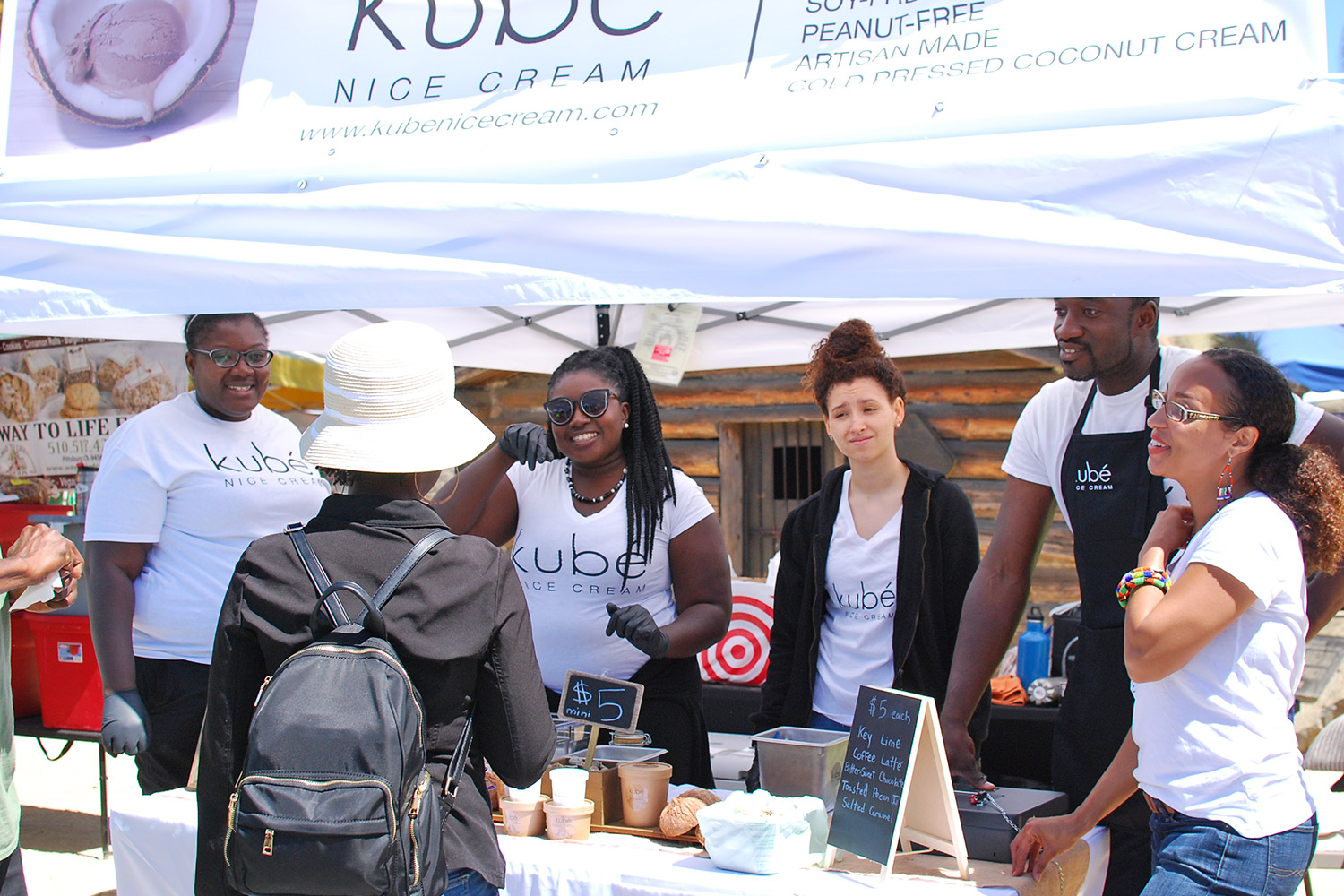Kubé Nice Cream Serves Up Raw Coconut and Food Justice
Brie Mazurek, CUESA Staff
August 24, 2018

If you’re lactose-intolerant, finding delicious, healthy, and sustainably made dairy-free ice cream at your local farmers market can be a challenge. Meet of Kubé Nice Cream popping up at Jack London Square Farmers Market, in partnership with Mandela Partners. While their medium is cool and delicious scoops of coconut ice cream, Kai and Nee-Nueh Nortey have a bold vision for food justice, community health, and economic empowerment.

Cracking Open the Coconut
Kubé Nice Cream was born out of Kai and Nee-Nueh’s shared quest for self-healing through food. Lactose-intolerant and navigating various food allergies, they delved deep into organic gardening and raw food to take back their health.
While on a trip to Ghana, they had a delicious and healing awakening while enjoying fresh, raw coconut. “We thought, ‘This is what we’re missing,’” says Kai.
Back home in Hayward, they started researching the fruit and learned about the positive health benefits of raw, unpasteurized coconut cream, including the presence of lauric and caprylic medium-chain fatty acids, which have been known to improve gut health. They also discovered the downsides of pasteurized, commercially available coconut milk, which includes chemical preservatives such as sodium metabisulfite, which has been known to cause severe allergic reactions.
So the couple went back to the source. They began experimenting with raw, mature coconuts to make an unpasteurized, non-dairy ice cream that was easy on the gut and unctuously smooth.
In 2014, Kai and Nee-Nueh started developing a business plan, and two years later, they launched Kubé Nice Cream. In the process, they had to design their own patent-pending equipment for scraping and shredding mature coconuts. Owning the means of production is central to their vision: “We were adamant about creating the tools that we need for self-determination and collective determination.”
Kubé’s coconut-based ice creams include flavors such as Key Lime, Salted Caramel, Turmeric Orange, and Dark Chocolate Chip—all made with real fruit and chocolate, of course. Their sales avenues have primarily been corporate and cultural events, weddings, and most recently, farmers markets. That’s where Mandela Partners comes in.

Mandela Partners
Based in Oakland, Mandela Partners is a 15-year-old nonprofit with a mission to “work in partnership with local residents, family farmers, and community-based businesses to improve health, create wealth, and build assets through local food enterprises in low-income communities.” Their scope has many facets, including healthy food access, community engagement and food education, and business cultivation.
With a focus on limited-resources entrepreneurs, who tend to be entrepreneurs of color, Mandela works with food entrepreneurs and farmers through varying levels of engagement depending on their needs, from group workshops to one-on-one advising to longer-term incubation support.
“We work in communities that are incredibly entrepreneurial. By fact of being limited-resource, they have, for generations, had that spirit of engaging in business and the good hustle that comes with that,” says Mariela Cedeño, Director of Business Development & Lending. “A lot of what we do is helping to diminish some of those barriers and increase access to technical assistance, capital knowledge, and networks, so they have the same opportunities that other folks that are better-resourced do.”
One of their success stories has been partnering with the worker-owned Mandela Grocery Cooperative, a full-service grocery store in West Oakland that opened in 2009 to increase access to healthy foods and provide job opportunities. The nonprofit’s current incubation partners include Zella’s Soulful Kitchen, Mandela’s Produce Distribution, and Ashland Market & Café.
Kai was introduced through Mandela Partners through a workshop, and later reached out for one-on-one business advising. Having established a strong brand and product, she was eager to take the next step into farmers markets and retail, as well as planning for future growth.
“Kai is really ahead of the curve,” says Mariela. “She came to us hitting the ground running and just needing some thought partnership.”
Simultaneously, Mandela Partners was in conversation with CUESA about offering a rotating pop-up booth at the Sunday Jack London Square Farmers Market. Launching this August, the pop-up offer entrepreneurs direct-sales experience, which provides a low-barrier but crucial next step in growing their sales channels, getting direct feedback from customers, and developing their product. Kubé Nice Cream was ripe and ready for the opportunity.
A Vision of Self-Determination
For Kubé, popping up at the farmers market has been a learning process and a positive next step in their business’s journey, with a warm reception from the community. Mandela Partners has supported Kai and Nee-Nueh in their market debut, and Mariela says, “It’s been a really great way for them to think about what it means to be in a farmers market—to understand the rules, the ebbs and flows, and also the limitations of production.”
“We know our value proposition is strong, but we didn’t know how well we would do,” Kai says. “It’s our first famers market, and we exceeded our expectations.”
As Kai notes, the majority of the world, including up to 90 percent of the Asian and African diaspora, is lactose intolerant, providing an enormous opportunity to serve people with healthy, sustainable, and exciting dairy-free alternatives. With ambitious plans on the horizon, Kubé will be launching a crowdfunding campaign soon, with sights on investing in a production facility, branching out into select grocery stores, and eventually opening a storefront.
Another big goal is to source coconuts directly from the farmers rather than through importers, which is difficult through global supply chains. “Our goal is to pay farmers directly for the work that they’re putting in, to make sure that they’re living well,” says Kai. “I’d love to get coconuts from Ghana, where my family is from,”
With help from Mandela Partners and the local community, Kubé is taking strides to re-envision their own supply chain, one rooted in self-determination and equity.
As Mariela puts it, “A big piece of our work is place-based because we see local entrepreneurship as a great way to revitalize neighborhoods and build community wealth and assets that are anchored in these spaces, while making healthy food options available.”
For Kai, being a food entrepreneur is a clear expression of her passion for food justice. “Food justice is the right to know what’s in your food, and to determine healthier food systems and health outcomes,” says Kai. “This is why small entrepreneurs matter—because we have our ear to the ground. We’re listening, and we know what the people want and what they need.”
Visit Kubé Nice Cream at Jack London Square Farmers Market this Sunday, and look forward to future pop-ups from Mandela Partners, such as Thank Que Grill starting in September.
Coconut and ingredients photos from Kubé Nice Cream.
Topics: Building Equity program, Entrepreneurship, Food justice

